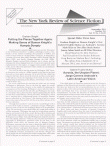 |


|
David G. Hartwell: Great Expectations |
September 2004 |
David G. Hartwell began his publishing career in 1971 as a consulting SF editor for Signet, moving to Berkeley in 1973, Pocket Books in 1978 (where he launched the Timescape imprint), Arbor House in 1985, and finally Tor Books in 1983 as consulting editor, becoming a full-time Tor/Forge senior editor in 1995.
In addition to editing thousands of SF books since 1970, Hartwell has published over 30 anthologies, including genre surveys The Dark Descent (1987), Masterpieces of Fantasy & Enchantment (1988), and The Science Fiction Century (1997); and with Kathryn Cramer The Ascent of Wonder (1994), The Hard SF Renaissance (2002), and annuals Year's Best SF and Year's Best Fantasy. His non-fiction book Age of Wonders (1984) is an examination of the history and culture of the science fiction
|
|

Photo by Beth Gwinn
www.davidghartwell.com
|
field. He's been involved in bookselling with Dragon Press (1973), initially in partnership with L. W. Currey; small-press publishing with Entwhistle (1968) and Dragon Press; and magazine publishing (also Dragon Press), co-founding The New York Review of Science Fiction (1988).
David Hartwell has been nominated for the Hugo Award 29 times, and has won the World Fantasy Award and the Milford Award for Lifetime Achievement in Science Fiction. He has taught at Harvard University, Clarion West, Clarion South, and NYU. He lives in Pleasantville, New York, with wife Kathryn Cramer and their children.
Excerpts from the interview:
“Science fiction publishing is unquestionably making more money than it ever has in the past. In the context of the lines that publish a lot of science fiction and fantasy and have bestsellers, the bestsellers are bigger than they’ve ever been. Tor, which I’m most intimately familiar with, is doing very well and has regular appearances on the bestseller list. Our biggest lead authors are extraordinarily successful, make a lot of money, and sell a lot of backlist every time they come up with a new book. People like L.E. Modesitt, Jr., Terry Goodkind, and Orson Scott Card bring in a lot of money — never mind Robert Jordan!
‘‘I’m the oldest science fiction editor both in tenure and in age — a position I hope to hold for the next 20 years. But I know that at any given moment, a corporation that owns a publishing company could decide to replace me with someone younger and less experienced.”
*
 “I’m fascinated by the extent to which the small press has been successful with horror and fantasy, and disappointed that it hasn’t been more successful with science fiction. I respect the success of Golden Gryphon, but there are not a lot of others who have done much science fiction. There’s some reason for that, because the horror market in mainstream publishing is very weak — you’re a big name and success, or you can’t get published. I would love to think of Thomas Ligotti as a big name, because he’s one of the best horror writers alive, but that would be based sheerly on the quality of his works, not on his sales.”
“I’m fascinated by the extent to which the small press has been successful with horror and fantasy, and disappointed that it hasn’t been more successful with science fiction. I respect the success of Golden Gryphon, but there are not a lot of others who have done much science fiction. There’s some reason for that, because the horror market in mainstream publishing is very weak — you’re a big name and success, or you can’t get published. I would love to think of Thomas Ligotti as a big name, because he’s one of the best horror writers alive, but that would be based sheerly on the quality of his works, not on his sales.”
‘‘Print-on-demand is fascinating, because I had expected it to sort itself out faster than it has. It’s still adjusting and readjusting, as conditions change quickly and the technology keeps changing. On the one hand, I’m astonished that so many people are still self-publishing their print-on-demand books. For the most part I have no desire to review them for The New York Review of Science Fiction, no desire to then turn around and buy them for Tor, and I don’t understand how they could possibly achieve any personal fulfillment or profit from doing it. Yet there must be something I’m missing, because they’re doing it in large numbers.”
*
 “In the world outside the United States market, there’s not enough of an audience to maintain a science fiction category in any publishing industry. Not in Australia or Canada, and not (as far as I can tell) even in England. So science fiction has to be published along with ‘speculative fiction,’ horror, and fantasy — often as a minor adjunct to fantasy.
“In the world outside the United States market, there’s not enough of an audience to maintain a science fiction category in any publishing industry. Not in Australia or Canada, and not (as far as I can tell) even in England. So science fiction has to be published along with ‘speculative fiction,’ horror, and fantasy — often as a minor adjunct to fantasy.
‘‘That’s certainly true in Australia. Only occasional science fiction books come out from the mainstream publishers, whereas there is a vigorous competitive fantasy field, which also includes ‘dark fantasy’ and/or horror (which often includes science-fictional tropes, images, or settings). What we would recognize as traditional science fiction is quite rare.”
*
 “I often make gloomy observations on the field but I am an optimist. If I was truly and sincerely a pessimist, I would be trying to find a way to retire — whereas in fact I’m trying to find a way to not only keep my job for the next 20 years but to expand my remit so I can do more anthologies and cover more areas and travel to more countries, and participate! I’m still enthusiastic about science fiction, even after all these years. I see talented younger writers, talented older writers, trends and traditions, new ideas and new science coming in (which is often fascinating), new styles, new voices. Every time one of the older authors dies, I am saddened by it and feel a loss; every time the publishing industry in some country in a part of the world that used to do a fair amount of science fiction stops doing science fiction, I am saddened by it — and that happens more and more. But on the other hand, we’ve got a vigorous science fiction publishing industry going in Poland. We didn’t use to have that. It’s great! So there is some birth and rebirth, as well as aging and dying.”
“I often make gloomy observations on the field but I am an optimist. If I was truly and sincerely a pessimist, I would be trying to find a way to retire — whereas in fact I’m trying to find a way to not only keep my job for the next 20 years but to expand my remit so I can do more anthologies and cover more areas and travel to more countries, and participate! I’m still enthusiastic about science fiction, even after all these years. I see talented younger writers, talented older writers, trends and traditions, new ideas and new science coming in (which is often fascinating), new styles, new voices. Every time one of the older authors dies, I am saddened by it and feel a loss; every time the publishing industry in some country in a part of the world that used to do a fair amount of science fiction stops doing science fiction, I am saddened by it — and that happens more and more. But on the other hand, we’ve got a vigorous science fiction publishing industry going in Poland. We didn’t use to have that. It’s great! So there is some birth and rebirth, as well as aging and dying.”
The full interview, with biographical profile, is published in the
September 2004 issue of Locus Magazine.
You may purchase this issue for $7.95 by sending a check to Locus, PO Box 13305, Oakland CA 94661; or via credit card submitted by mail, e-mail, or phone at (510) 339-9198. (Or, Subscribe.)
|
 |

